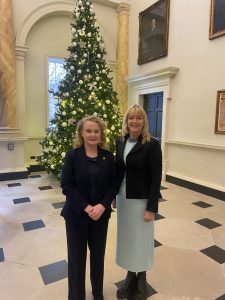Mary has received the following update regarding the following areas in the education sector:
- Phased return to school
- Vaccination rollout for education sector
- Antigen Testing
- Ventilation in schools
- Special Education Teacher allocations
- Department statement on RTE Investigates programme
- State Examinations
- Procurement process for Leaving Cert Examinations 2021 and Accredited Grades process
Government plan for phased return to school
In line with the current public health advice regarding living with Covid-19 currently it is the government’s intention that all students will return to school from Monday 12 April.
This is the final stage in the phased reopening of all schools and will see the return of all children to in-school learning, including the first to fourth year groups at post-primary level.
Public health has reviewed the measures put in place to ensure safe operation of schools and is satisfied that these infection prevention and control measures, when rigorously implemented correctly and adhered to, will keep the school community safe during this period. The Department of Education will continue to fund and support infection prevention and control measures in schools to ensure the safety of the school community.
The Department of Health and the HSE have reaffirmed that schools in themselves are low risk environments and we will continue to work together with public health and the education partners to support the safe operation of schools during this time. Parents are however advised to be vigilant over the Easter break and avoid play dates or sleepovers so that we can continue to keep numbers as low as possible and continue with the next phase of the reopening of schools.
The Department of Education, the Department of Health and the HSE will continue to monitor and review the operation of schools on an ongoing basis. Weekly reports on the testing of close contact within the education system are published and available on the HPSC website.
In October 2020, 55 Department of Education inspectors were assigned to work for half their time with the HSE on their dedicated School Teams, in six of the regions of the HSE. The purpose of their work is to assist schools/settings where a positive case of Covid-19 is identified. Inspectors conduct Public Health Risk Assessments in such schools and settings following a notification of a COVID-19 case by the school/setting to the HSE.
Following the reopening of schools on a phased basis, the Inspectorate also committed to increasing the percentage assignment of these inspectors to the HSE if and when required. As a result, 24 inspectors will increase their assignment, on a temporary basis, to 75% with the HSE towards the end of March.
The dedicated principals’ help line will also remain available as a key resource.
Vaccination Rollout
The National Immunisation Advisory Council’s recommendation, adopted by NPHET, is that the remainder of the population after Group 9 will be completed on an age basis from those aged 64 years and younger, and that this decision will replace the previous groupings in the original plan.
This decision has implications for many sectors including school staff and will result in those working in schools being vaccinated with their age cohort. People who are medically vulnerable including school staff will continue to be vaccinated in line with their original grouping.
Antigen Testing
The Department is a member of the recently established Pilot Project Working Group for Antigen Testing in the Education Sector which will be reporting to the HSE/Department of Health Testing and Tracing New Initiatives Steering Group.
The pilot is seeking to investigate how rapid antigen detection testing (RADT) might be used in educational settings, including in Primary and Post Primary schools to detect SARS-CoV-2 in asymptomatic individuals and contribute to on-going COVID-19 control measures.
Ventilation in Schools
Managing classroom ventilation is one of a number of prevention and control measures in place to ensure schools are safe. Practical steps for the deployment of good ventilation practices was provided to the school system in the context of re-opening for September 2020.
This guidance was reviewed and updated on 30 November. Schools were reminded of the importance of good ventilation as part of the current phased re-opening of schools.
In summary, the overall approach for schools should be to have windows open as fully as possible when classrooms are not in use (e.g. during break-times or lunch-times (assuming not in use) and also at the end of each school day) and partially open when classrooms are in use. It is worth noting that windows do not need to be open as wide in windy/colder weather in order to achieve the same level of airflow into the classroom. This will assist in managing comfort levels in classrooms.
Managing comfort levels will be easier for schools now than during the winter period.
As we move towards the summer period there will be more opportunities to facilitate outdoor learning, particularly at primary level, and these opportunities should be maximised.
In updating the ventilation guidance in November, the Department’s Planning and Building Unit reviewed the HPSC guidance that consideration be given to installing an indoor air quality monitor in classrooms. The updated guidance sets out that in the main windows are likely to be required to be open at a frequency and level in the classroom irrespective of whether the opening of windows is prompted through the indoor air quality monitor (re-active approach) or through the pro-active approach outlined in the Department’s guidance and that therefore it is not considered necessary to install such monitors in classrooms.
An expert group on ventilation was established to assess the role of ventilation in reducing transmission of Covid-19. The HPSC notes that its updated guidance is pending the findings of this expert group.
While the Department has provided very good and practical guidance for schools to achieve good ventilation, it will also be examining what areas of the ventilation guidance can be further strengthened in light of experiences to date and any feedback from the work of the expert group.
A Ventilation Working Group involving all relevant Departments (including Department of Education) has been established by the Department of the Taoiseach to coordinate this work. The first meeting of this Group took place on 18 March and it will be meeting again after Easter.
It is envisaged that the updating of the guidance will be done over the coming weeks and that consultation with relevant stakeholders will take place after Easter prior to finalisation and publication of updated guidance.
It is also worth noting that the rollout of the vaccination programme over the coming months will be an additional prevention and control measure for keeping COVID out of school communities in the coming school year.
Special Education Teacher allocations
In order to minimise disruption and upheaval for schools as much as possible in light of Covid-19, and to provide for continuity of allocations, the existing Special Education Teacher Allocations for schools will be maintained for the 2021/22 school year, with re-profiled allocations now due to be made from September 2022.
The allocations for 2021/22 which are being maintained comprise the allocations which were made for schools from September 2019 plus any additionality achieved since plus any developing hours for the 2019/20 and 2020/21 school years.
No school will receive a reduction to their current allocation.
Importantly, additional allocations will also continue to be made for new schools, schools which achieve developing status, and for exceptional circumstances. Schools that qualify for additional mainstream developing school posts also qualify for additional special education teaching allocations to take account of this developing status.
If a school considers that exceptional circumstances have arisen in their school, which means that they cannot provide for the special educational teaching needs of pupils due to very significant changes to the school profile occurring, a school may seek a review of their allocations by the NCSE.
There are currently over 13,600 special education teachers allocated to mainstream primary and post-primary schools. This represents an increase of 40% in the total number of special education teachers allocated to schools since 2011. A further 145 special education teacher posts are provided as part of Budget 2021.
Department of Education Statement on RTE Investigates programme
In light of the RTÉ Investigates segment on the RTÉ Primetime programme last week the Department of Education is reviewing relevant procedures and practices.
The Department of Education would like to reassure all parents, families and interested parties that the Department has never unlawfully collected or passed on the sensitive educational information of children involved in court cases.
State Examinations
The SEC candidate portal has closed to registrations with 95% of students registered for the Leaving Certificate examinations and/or Accredited Grades process before the deadline.
The portal will open again in late April/ early May for candidates to confirm their choices.
The timetable for the State examinations is available at examinations.ie
The oral examinations will be held from Friday 26March until Thursday 15 April. This year, as part of the public health measures being undertaken to hold the examinations safely, the oral examination interview is being organised by schools.
The teacher will ask the questions and conduct the interview, but they will not mark candidates’ performance. The examinations will be recorded on a recording device, and the recording will be submitted to the State Examinations Commission. It will then be marked by an external examiner.
Procurement process for Leaving Cert Examinations 2021 and Accredited Grades process
The Leaving Certificate examinations and Accredited Grades process will be conducted by the State Examinations Commission, and legislation is currently being developed to enable this.
The detailed design of the Accredited Grades model will be informed by expert advice, including external statistical, coding and psychometric expertise. A procurement process has been carried out by the Department to acquire necessary coding and psychometric expertise in order to ensure confidentiality, reliability and timely refinement of the standardisation model, to enable delivery of Accredited Grades to students.
As this process is one of sensitivity and urgency, the tender documents are not being published.
The procurement process has recently concluded and the tender has been awarded to Educational Testing Services (ETS). ETS is a world-leading US-based non-profit organisation which specialises in educational measurement. ETS will work with the Department of Education and the State Examinations Commission to deliver the various elements of the standardisation model and the implementation of the standardisation process.
More information can be found here




